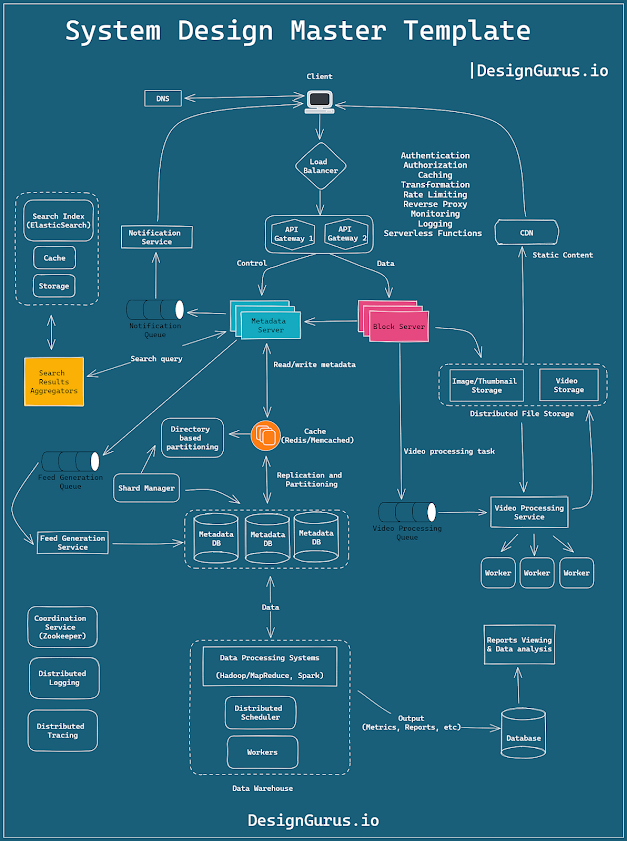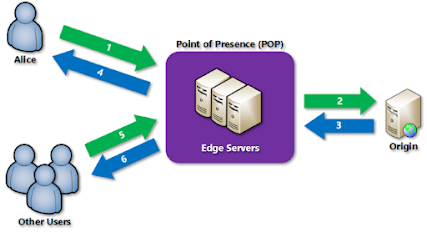Before we get into the details though, what is a system design interview? What do the interviewers really expect from the candidates?
You should be able to design a system that satisfies the requirements given to you and scales well.
Your design should be pluggable and not restrict the addition of new features.
You should be able to compare various alternatives and choose the most optimal one. Things like, which database is the most important, or which protocol should you use, or what’s the best approach to scale a system, etc.
You should know the basics that are relevant from a system design standpoint like:
APIs
Caches
Databases
Network Protocols
Message queues
CDNs
High-level details about ML and Big data
CAP Theorem
Monitoring and analytics
4 Steps to Prepare for System Design Interviews in 2025?
Here’s how you can crack the System design round interview of any FAANG company (Facebook/META, Amazon, Apple, Netflix, and Google) or get into FAANGThere is a simple four-step process to ace any System Design round.
Learn essential System Design Concepts
Learn from the tech giants by reading their engineering blogs
Solve common System Design questions
Practice
1. Learn Essential System Design Concepts
Any system design interview will definitely require you to come up with a basic high-level design for whatever system you are trying to build. There are some components that will be needed for sure. Make a note of these components.
Here are a few -
1. 1 Load Balancer
You cannot have a distributed system without a load balancer to distribute the incoming requests among various nodes. This ensures proper resource utilization and that there is no single point of failure in your system. Here’s how Nginx does it.
1.2 Cache
Most systems have some read-heavy interactions, some information that the user will access frequently but not update as much. It makes sense to cache this information in such a way that it can be easily fetched without the need for a DB lookup.
Think low latency. Also, based on your use-case, you might need to store more frequently accessed information or more recently accessed information. So, read up on various eviction policies.
1.3 Database
Again, there can be no system without some form of data storage. Whether you want to store files, images, product information, financial transactions or simply dump all the data from various user interactions to run analytics later.
It all needs databases. So read up on it. Find out what matters when you are selecting a database, read about SQL/NoSQL, query patterns, and how CAP theorem might come into play while making tradeoffs.
1.4 Message queues
Sometimes our system needs to perform some tasks that need to be done but not necessarily immediately, or their outcome does not affect the user’s journey.What if you need to insert information in your database, and bulk insert could be more efficient?
1.5 CDN
When your users are distributed geographically, getting your content to them in a reasonable amount of time becomes a real challenge. CDNs allow us to maintain a copy of our data in various data centers located closer to the users’ location to reduce the latency.
Here is a short video about how Akamai does it.
1.6 Analytics and Monitoring
This is something that is needed in every system you create. This is a hidden requirement, no one calls it out in the requirement gathering but every interviewer wants this.
User logs in or logs out? Wishlisted an item? Payment failed? It is all the information for us! Anything of importance happens, fire an event and save it in your messaging queue.
You can perform real-time analytics on data or just dump it in a Hadoop cluster to use later.
Similarly, if an API call is regularly failing, or if your servers are about to run out of resources, wouldn’t you like to know of it beforehand?
1.7 Network Protocols
Based on your requirement, based on the type of content you are sharing, you might need to make a decision on which network protocol to use.
Read up on various network protocols like TCP and UDP, and when are they relevant, what might be the compromises you might need to make, etc.
The first step is to know about all these concepts. And by knowing concepts, I don’t mean just some theoretical knowledge of what these are, but more practical hands-on experience about what should be used when.
You need to know things like:
Which is the best alternative to choose from, given the use-case.
What are the tradeoffs that you need to consider while making these decisions?
Best practices for certain use-cases.
To know most of these things, I’ll recommend going through this course on System Design by CodeKarle, which covers all of the above with concrete examples from the real world.
2. Learn from the tech giants (read their engineering blog)
This is probably not going to help in the short term. But in the long term, to become an expert in System Design, it’s best to look at the Tech blogs of various tech companies and see how they are solving various technical problems.
This would paint a clear picture of the real problems that they face and how innovatively they solve them.
Understanding these things would help you become better at system design and also keep you up to date with the latest innovations in tech.
Some of the best blogs to follow are:
3. Solve Frequently asked System Design questions
The most common questions are:
Tinyurl System Design
Twitter System Design
Facebook System Design
Whatsapp System Design
Airbnb System Design
Uber System Design
How to design Amazon Prime Video
How to design Google Search
How to design NetFlix
How to Design a distributed Message Queue
How to design Rate Limiter?
How to design a distributed Queue?
Difference between SQL and NoSQL?
If you need resources to solve these questions, something which not only solves the question but also explains the underlying concepts and approach to solving system design questions then this highly-rated course by CodeKarle discusses most of these case studies and some more problems, which has helped many people crack their interviews for companies like Google, Facebook, Microsoft, Amazon, etc.
4. Practice, Practice, and more Practice
Practice, practice, practice! Did I say practice? There are a lot of resources out there. I have shared a few that discuss some of the most popular system design problems in detail. Once you go through a few of them you will start noticing a pattern and will soon be able to come up with solutions on your own.
Get a better understanding of how your systems are designed in your organization. How are the other teams doing things? What factors do they take into consideration? The next best thing is to practice with a friend.
Make sure you go through a few mock interviews before your actual interview to avoid some common but easily avoidable pitfalls.
Some most common mistakes that I have seen people make are:
Not driving the interview
Not asking questions
Not structuring the interview properly
Running out of time
Not considering the requirements
Not exploring all the alternate design options
All these mistakes can be easily avoided by having a few mock interviews with someone who knows System Design well. And time your interviews. The target must be to reach a solution within 40 minutes, including time for some discussion.
Best Books and Courses to Prepare for System Design Interviews in 2025
Now that we know which topics to prepare, which blogs to read, and which System design problem to solve, let's see which book you can read and which online courses you can join to prepare well for your System design interview in 2025
- Codemia.io - LeetCode for System Design
- CodeKarle's System Design Interview Course on Udemy
- Grokking the System Design Interview on DesignGuru
- Mastering the System Design Interview by Frank Kane (Ex Amazon Hiring Manager)
- Software Design and Architecture Specialization [Coursera]
- Pragmatic System Design [Udemy Course]
- Web Application & Software Architecture 101 [Educative.io]
- System Design Interview — An Insider’s Guide by Alex Xu
That's all about how to prepare for System Design Interviews in 2025. We have discussed essential System Design Interview topics, concepts as well as popular System Design questions for practice.
With this 4 step process, you’ll soon be ready to ace any of your system design interviews! Hopefully, this should be a good starting point for you.
Happy learning! and all the best for your System design interview
If you need more resources to prepare for the System design Interview here are my recommendations:
- Is Hacking System Design Interview Book worth it?
- 20 System Design Interview Questions with Answers
- Top 5 Websites to learn System Design in depth
- Is Grokking the System Design Interview worth it?
- Is DeisgnGuru's System Design course worth i?
- 6 Best Courses to learn Dynamic Programming
- Top 10 System Design Interview Books
- Is ByteByteGo Good Place to learn System Design
- My favorite courses to learn Software Architecture
- Is Grokking the Advanced System Design course worth it?
- 3 System Design Cheat Sheet You can refer for interviews
- 10 Free System Design Courses for Beginners and Experienced
- Top 5 System Design Course from Udemy
- 30 System Design Interview Problems for Practice




Good guide but how about adding Mock interviews? I have come across AI powered Mock interviews which can really help candidates preparing well for this kind of interviews, the ones which is offered by Educative.io in their premium plus plan, I really loved it.
ReplyDelete